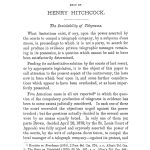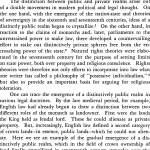Search in propria persona
Find material relevant to your interests.
 Pursuing “freedom of information” requests to, and responses from, state governments.
Pursuing “freedom of information” requests to, and responses from, state governments. In response to the valorization of economic liberty, Progressives articulated an alternative vision of real liberty for the modern, industrial world.
In response to the valorization of economic liberty, Progressives articulated an alternative vision of real liberty for the modern, industrial world. Howard B. White, “The Right to Privacy,” Social Research 18, no. 2 (1951): 171–202.
Howard B. White, “The Right to Privacy,” Social Research 18, no. 2 (1951): 171–202. If a blind customer has to rely on employees to tell them about a mandatory arbitration agreement—and there’s no evidence an employee ever does so—is that still binding?
If a blind customer has to rely on employees to tell them about a mandatory arbitration agreement—and there’s no evidence an employee ever does so—is that still binding? Quarantine to create a strong national border (“picket line”) against yellow fever, from The Washington Post in 1897.
Quarantine to create a strong national border (“picket line”) against yellow fever, from The Washington Post in 1897. In American law, the home is a sacred space. This sanctity is deeply connected to old the English common law and the high value placed on private property—but the special nature of the home in the United States goes further than mere property rights.
In American law, the home is a sacred space. This sanctity is deeply connected to old the English common law and the high value placed on private property—but the special nature of the home in the United States goes further than mere property rights. Quick thoughts on property, the home, and Carpenter v. United States, plus a capture of some relevant quotes.
Quick thoughts on property, the home, and Carpenter v. United States, plus a capture of some relevant quotes. In 1967, President Johnson’s Crime Commission investigated electronic surveillance and concluded that the state of the law was “intolerable.”
In 1967, President Johnson’s Crime Commission investigated electronic surveillance and concluded that the state of the law was “intolerable.” Orin Kerr explains how the modern assumption that traditional Fourth Amendment doctrine revolved around the law of trespass is wrong.
Orin Kerr explains how the modern assumption that traditional Fourth Amendment doctrine revolved around the law of trespass is wrong. Molly McGann: “The Comstock Law shifted censorship from the urban public sphere to the liminal space between the public sphere and private sphere.”
Molly McGann: “The Comstock Law shifted censorship from the urban public sphere to the liminal space between the public sphere and private sphere.” From Molly McGarry: “Beginning in the 1860s, reformers attempted to protect the nation’s private homes by policing the public sphere.”
From Molly McGarry: “Beginning in the 1860s, reformers attempted to protect the nation’s private homes by policing the public sphere.” “Secrecy is not the same as private. Secrecy is toxic. Private is mature and grown up.”
“Secrecy is not the same as private. Secrecy is toxic. Private is mature and grown up.” The key takeway: online classes are nothing like in-person classes, and we should treat them that way.
The key takeway: online classes are nothing like in-person classes, and we should treat them that way. Science combined with religion to play an important role in justifying and enabling new intrusions into the private lives of Americans leading up to Prohibition.
Science combined with religion to play an important role in justifying and enabling new intrusions into the private lives of Americans leading up to Prohibition. Legal historian Morton Horwitz wrote, “The distinction between public and private realms arose out of a double movement in modern political and legal thought.” He concluded that the distinction was breaking down as “private institutions were acquiring coercive power that had formerly been reserved to governments.”
Legal historian Morton Horwitz wrote, “The distinction between public and private realms arose out of a double movement in modern political and legal thought.” He concluded that the distinction was breaking down as “private institutions were acquiring coercive power that had formerly been reserved to governments.” From an 1887 book arguing for eugenics as part of public health and education.
From an 1887 book arguing for eugenics as part of public health and education. The form of letters imposes obligations, emphasizes authority, and exerts certain kinds of authority.
The form of letters imposes obligations, emphasizes authority, and exerts certain kinds of authority. In 1879, Henry Hitchcock responded to the growing calls for telegrams to receive privacy protections. He analyzed the existing case law, the arguments for or against such protections, and proposed a path forward.
In 1879, Henry Hitchcock responded to the growing calls for telegrams to receive privacy protections. He analyzed the existing case law, the arguments for or against such protections, and proposed a path forward. In 1883, journalist Charles T. Congdon wrote an article, “The Adulteration of Intelligence,” warning about power of the press if misused (and when combined with control of telegraph wires and wire services).
In 1883, journalist Charles T. Congdon wrote an article, “The Adulteration of Intelligence,” warning about power of the press if misused (and when combined with control of telegraph wires and wire services). In a 1983 article, “The Rise of Communications Regulation: The Telegraph Industry, 1844-1880,” Richard B. Du Boff discusses the growing power of industry (Western Union, especially) and the resistance of the growing telegraphic monopoly to government regulation—even as it routinely accepted government subsidies.
In a 1983 article, “The Rise of Communications Regulation: The Telegraph Industry, 1844-1880,” Richard B. Du Boff discusses the growing power of industry (Western Union, especially) and the resistance of the growing telegraphic monopoly to government regulation—even as it routinely accepted government subsidies.